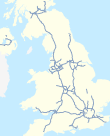M42 Motorway (Great Britain)
History
Planning and construction
Plans for a new motorway by-passing the south and east of Birmingham, reaching Tamworth and connecting the M5 and M6 motorways, were announced in 1972.
The first section opened in November 1976 linking Birmingham Airport with the M6 motorway.
The curve around the south-eastern side of Solihull opened in September 1985 followed by the section from the M6 with the A5 at Tamworth in December 1985. The southern section of the motorway to Alvechurch just north of Redditch to form a junction with the A441 and from A5 at Tamworth with the A444 at Measham opened in 1986.
In 1987, the section to the A38 at Bromsgrove, 15 miles (24 km) south of Birmingham was completed. and then in December 1989, the motorway was completed with the opening of the link from the M5.
A planned section north of the M6 running to the M1 near Nottingham was never constructed as planned being replaced by the A42 link, a trunk road which was completed in August 1989 to link with the M1 motorway near Nottingham.
When first built, there was no direct connection between the M5 South and M42. Westbound M42 traffic similarly had no direct connection to the M5 North. Instead traffic had to use the A38 between M5 junction 4 and M42 junction 1.
Operational history
Junction 3a was remodelled to give priority to traffic operating between the now westbound section of the M42 and the extended M40 motorway, which opened in stages between December 1989 and January 1991.
The section of the M42 between junctions 7A and 9 was re-built as part of the M6 Toll works and now forms the link between the M6 and the southern end of the toll road. The M6 Toll opened in 2003.
Active Traffic Management with hard shoulder running and variable speed limits were introduced in 2006.
Since the 1980s, there have been constant plans to build a new service station on the motorway south of Birmingham Airport and the NEC, but this has yet to be built.
Features
Birmingham Outer Ring Road
Along with sections of the M5 and M6, the southern sections of the M42 form the Birmingham Outer Ring Road motorway around Birmingham. Much like the M25 around London, and the M60 around Manchester, there are areas where this orbital system does not work well. One such point is junction 3A, the link between the M42 and the M40, where traffic is often heavy in the rush hour. The intersection between the M42 and M6 is often very busy too, especially when travelling along the M6.
Managed motorways and Active Traffic Management
Active Traffic Management (ATM) was launched as a pilot scheme on the M42 operating between junction 3a and 7 with mandatory variable speed limits, hard shoulder running, better driver information signs and a new incident management system. This system allows operators to open and close any lane to traffic in order to help manage congestion or an incident. Between 2006 and 2007, journey times have decreased by 26% northbound and 9% southbound and journey time variability has decreased by 27%. Due to the success of the trial this system was later extended northbound to junction 9 of the M42 (and onto the adjacent M6 to junction 5) and southbound along the M40 to junction 15 as part of the first phase of a nationwide roll out of the rebranded 'Managed motorways; concept.
Incidents and accidents
- A collision involving 160 vehicles occurred on 10 March 1997 in fog in Bromsgrove, Worcestershire which resulted in three deaths and 60 injuries.
- Drivers have rated the M42 as the worst motorway in England, in a 2024 survey from Transport Focus, scoring 56 per cent for overall satisfaction from road users, citing speed limits ("for no reason"), delays, roadworks and potholes.
Future work
As of 2022 work is under construction on a new junction (5A) located between Solihull junction 5 and Birmingham Airport/NEC junction 6 and 2.4KM of new dual carriageway alongside the motorway to:
- ensure the safe and reliable operation of the road network
- increase the capacity at junction 6, reducing congestion
- improve access to key businesses and locations such as Birmingham Airport and support economic growth in the area
- improve access for cyclists, walkers and other vulnerable users of the network
Junctions
This article contains a bulleted list or table of intersections which should be presented in a properly formatted junction table. (December 2021) |
Data from driver location signs are used to provide distance and carriageway identifier information. If a junction extends over several hundred metres and both start and end points are known, both are shown.
Coordinate list
- ^ 52°20′56″N 1°48′35″W / 52.3488°N 1.8097°W Termination point M40
- ^ 52°28′39″N 1°42′39″W / 52.4774°N 1.7109°W Southern M6 / M42 intersection
- ^ 52°29′01″N 1°42′38″W / 52.4837°N 1.7106°W Northern M6 / M42 intersection
- ^ 52°41′37″N 1°32′49″W / 52.6935°N 1.5470°W J11, A42
See also
References
- ^ "'Extra lane' plan to be extended". BBC News. 25 October 2007. Retrieved 31 December 2007.
- ^ "M42 death crash driver wins back his licence". Archive.worcesternews.co.uk. 10 November 2001. Archived from the original on 1 July 2012. Retrieved 6 November 2010.
- ^ "M42 motorway rated England's worst in driver survey". bbc.com. Retrieved 15 October 2024.
- ^ "Works to create new slip roads on M42 to begin". Solihull Observer. Retrieved 5 July 2024.
- ^ "M42 junction 6". nationalhighways.co.uk. National Highways. 19 May 2020. Retrieved 6 July 2024.
 Text was copied from this source, which is available under an Open Government Licence v3.0. © Crown copyright.
Text was copied from this source, which is available under an Open Government Licence v3.0. © Crown copyright.
- ^ Driver Location Signs, M42 J1-7 (map) – Highway Authority, 2009
